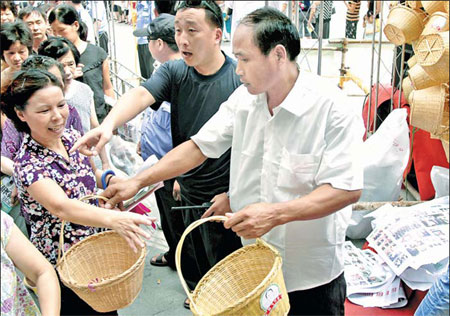Upset with the degradation of a local scenic spot, a 52-year-old farmer from Zhejiang Province has become a one-man environmental protection agency, helping to prod the government into restricting the use of ultra-thin plastic bags.
 |
|
Chen Fei distributes environmentally friendly bamboo baskets in Wenzhou, Zhejiang province, last week, continuing his campaign to limit the use of ultra-thin plastic bags. |
Chen Fei is a household name in his village of more than 700 families in Zhejiang Province. Since 2000, he has traveled to 19 provinces and handed out more than 10,000 free bamboo baskets to shoppers at food markets.
Chen's campaign to promote the use of environmentally friendly bamboo baskets instead of plastic bags recently received support at the highest level - the State Council has banned the production, sale and use of ultra-thin plastic bags starting from June 1. Retailers who continue to offer free plastic bags will be fined between 5,000 and 10,000 yuan.
It's hard to say how much Chen's campaign had to do with the regulation. But one thing is for sure: the government ban has made him "more determined and confident" than ever to continue his mission.
"I don't consider my eight years of effort to have been wasted at all. My mouth and my two feet used to be the only weapon I had. Now the government regulation has given me an opportunity to do much more," said the sun-tanned farmer.
Chen began his campaign in 2000 because he was shocked by the number of plastic bags stuck on trees along the banks of the Nanxi River near his village. The bags, which clung to the trees after the river receded from its annual flood levels, detracted from what had been considered a scenic spot.
After his son showed him an article on the Internet saying that some plastic bags are poisonous, Chen became determined to do something. The reason for his green campaign is simple.
"The plastic bags hanging on trees are ugly. I want the river to be clean, as it was during my childhood," he said.
Chen first tried selling homemade bamboo baskets at the market in his village, the main source of plastic bags in the area. No one bought his baskets, however, because they could get plastic bags for free.
Undaunted, Chen decided to give out free baskets, believing that people would grow to prefer them. He gave one basket to each family and 10 to each stall at the food market. If someone forgot to bring a basket, he or she could borrow one from the owner of the stall.
Little by little, Chen gained support from his neighbors. But his dream was not confined to one village. Starting in 2003, he began to travel to other parts of the country, spending about 40 days a year away from home during slow periods in the farming season.
The eight-year campaign has cost Chen nearly 200,000 yuan, mainly on travel expenses and on baskets he buys from his neighbors for about 10 yuan each. The money came from his family's savings and from his son, who works as an accountant for Aokang Group, a major footwear manufacturer based in Zhejiang. Besides farm work, Chen also sells fertilizer to augment his income.
"Many people said my father was crazy. But he is quite stubborn and never gives up," says Chen's son, Chen Xiangwu.
Chen's wife also complained in the beginning, but seeing that he was determined, she gradually gave up nagging him.
Chen's campaign came to national attention in March, when he attended the annual session of the National People's Congress in Beijing as a deputy. He lugged 56 bamboo baskets all the way from Zhejiang to the capital to present them to other deputies.
Since the government regulation restricting the use of plastic bags, Chen has become even busier.
"I will continue my travels and go to the remaining 12 provinces and municipalities," he said.
Now that supermarkets have begun to charge 0.2 to 0.5 yuan for each plastic bag, Chen plans to focus on "wet" or farmer's markets.
"Wet markets are still a problem for effective implementation of the regulation because vendors still offer free ultra-thin plastic bags there," he said.
Chen has also expanded his efforts, setting up a neighborhood environmental protection organization last year. The Green Association of Volunteers in Yongjia County, as it is called, has more than 400 members, including officials, teachers, farmers, students and business people.
In June, the association launched a cleanup campaign on the Nanxi River. They picked a 30-kilometer section of the river and walked along the riverbanks collecting trash, especially plastic bags. The section, where two tributaries meet, used to be considered the most beautiful spot on the river.
"We plan to do it once a month," Chen said.
(China Daily August 13, 2008)